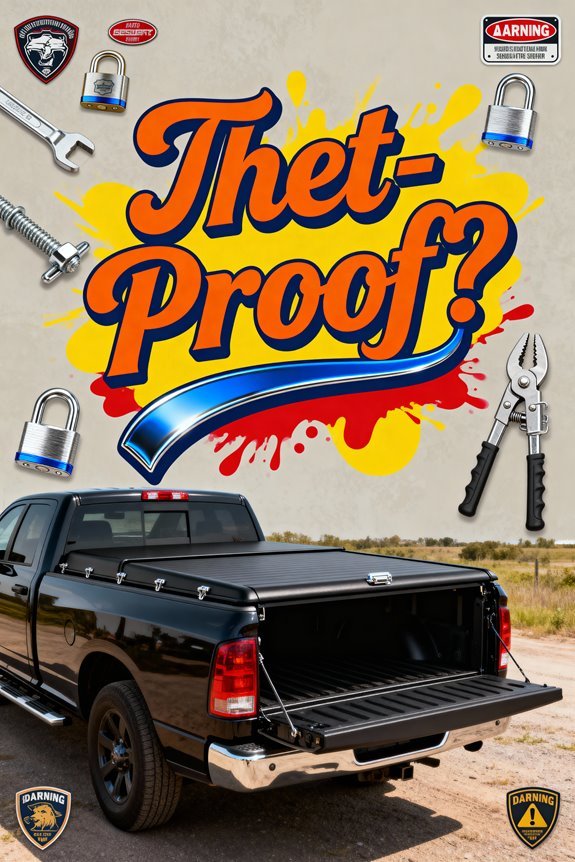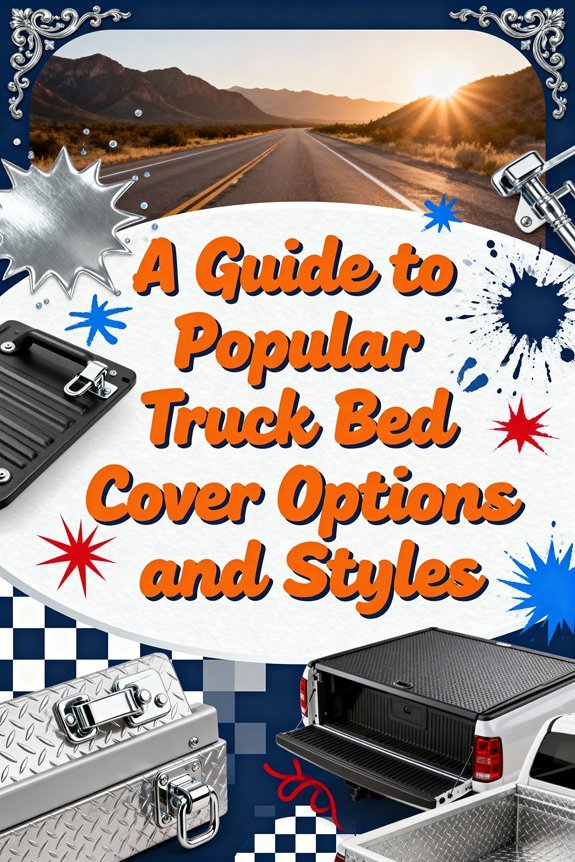Tonneau covers aren’t theft-proof, but they’re highly effective deterrents. Hard folding and retractable models with integrated locking mechanisms reduce break-ins by 22% and deter 84% of opportunistic thieves. However, determined criminals can exploit vulnerabilities—41% of breaches target rail-mounted systems, and 22% bypass covers through tailgate weaknesses. Soft roll-up covers offer minimal protection beyond concealment, while hard covers create substantial barriers. You’ll maximize security by combining tonneau covers with reinforced tailgate locks and alarm systems, transforming your truck bed into a notably more challenging target that demands time, tools, and noise to compromise.
What Makes Tonneau Covers a Security Feature for Your Truck?
While truck beds offer convenient open cargo space, they simultaneously create vulnerability to theft that costs vehicle owners thousands annually. Tonneau covers address this risk through engineered security benefits that transform your exposed cargo area into a protected storage system.
The key features that establish tonneau covers as legitimate security components include integrated locking mechanisms—dual deadbolts and sliding locks that resist forced entry. Constructed from aluminum, fiberglass, or reinforced ABS plastic, these covers withstand physical attacks while their overlapping designs eliminate entry gaps. Anti-theft configurations require cover removal before tailgate access, creating multiple barriers for potential thieves.
Most critically, tonneau covers eliminate visibility—the primary factor in opportunistic theft. Custom-fit designs minimize weak points, while flush-mount installations reduce potential breach locations. Hard folding covers made of rigid panels offer particularly strong theft resistance and durability by sealing the bed area against both unauthorized access and environmental exposure. Beyond security, quality covers provide water-resistant protection that shields cargo from rain and harsh weather conditions. The versatility of tonneau cover styles allows customization for different hauling needs while maintaining security features. These combined elements create measurable theft deterrence.
Understanding the Different Types of Tonneau Covers and Their Security Levels
Because not all tonneau covers deliver equivalent protection, you’ll need to evaluate each design category against specific security criteria before making a purchase decision. Soft roll-up covers constructed from vinyl or canvas offer minimal theft deterrence despite providing weather barriers and visual concealment. Hard roll-up covers combine convenience with enhanced protection against impacts and theft, typically using aluminum panels or reinforced plastics to increase resistance through stronger cover materials and integrated locking mechanisms. Soft folding designs maintain limited security due to pliable construction, while hard folding variants—often featuring aircraft-grade aluminum with powder-coated finishes—deliver substantial theft resistance and support loads exceeding 300 lbs. Retractable and one-piece hard covers represent maximum security through rigid construction and lockable systems keyed to your ignition. Popular models like the BakFlip series demonstrate how hard folding covers balance security with functionality through their robust aluminum construction. Installation options range from simple hook-and-loop attachments to permanent mounting hardware, directly influencing theft-proofing effectiveness across all categories. Most hard folding covers can be installed in about 20 minutes using basic tools like hex keys and screwdrivers without requiring drilling or complex modifications.
How Locking Mechanisms Work to Protect Your Cargo
Your cargo’s protection hinges on how effectively the locking mechanism integrates with the tonneau cover‘s structural design and attachment points. Hard folding covers employ integrated locks at tailgate panels with perimeter EPDM seals resisting prying attempts. Retractable models use rail-mounted bolt lock technology preventing unauthorized sliding or lifting through dedicated lock cylinders. Soft roll-ups primarily depend on tailgate locking to conceal latches, though vinyl material remains vulnerable to cutting—a factor reflected in theft statistics showing hard covers outperform soft alternatives. Cable-based folding systems distribute locking pressure across multiple points simultaneously, enhancing security over simple roll-ups. Advanced covers with multiple locking points often overlap the tailgate, requiring both cover and tailgate locks to be released before access is granted. However, lock design quality and proper installation remain critical; poorly fitted cylinders compromise any cover type’s effectiveness regardless of construction materials or mechanical complexity. Roll-up covers attach along sturdy side rails mounted to the truck bed, which serve as the foundation for the entire locking system’s integrity. Periodic lubrication of locking mechanisms ensures smooth operation and prevents corrosion that could weaken security features over time.
The Reality Behind Theft Statistics: What the Numbers Actually Tell Us
How do theft statistics translate into actionable risk assessment for your truck? The data reveals concrete patterns: exposed cargo faces four times higher theft risk than concealed loads, with visible items driving 71% of pickup-related incidents. Your average loss hovers around $740-$1,200 per event when cargo remains unprotected.
Locking tonneau covers demonstrate measurable theft prevention effectiveness, reducing break-ins by 22% and causing 84% of opportunistic thieves to abandon attempts. This cargo security improvement stems from two factors: concealment eliminates target visibility, while physical barriers extend access time beyond the critical 10-second window most smash-and-grab operations require.
The statistics confirm tonneau covers aren’t impenetrable but fundamentally alter your risk profile by transforming your truck from an easy, visible target into one requiring considerably more effort and exposure time. Material composition significantly impacts security performance, with hardened aluminum covers providing superior protection compared to vinyl alternatives that can be compromised more easily. Hard folding covers represent a mid-tier investment starting around $650 that balances weather resistance with enhanced theft deterrence. Soft covers add minimal weight to your vehicle while maintaining higher payload capacity, though they sacrifice some security compared to their rigid counterparts.
Hard Covers vs. Soft Covers: Which Offers Better Protection Against Thieves?
Material composition directly determines your tonneau cover’s resistance to theft attempts. Hard covers utilize rigid fiberglass, aluminum, or reinforced plastic with integrated locking mechanisms, creating substantial barriers that require tools and time to breach. Soft covers employ vinyl or fabric over frames—materials vulnerable to cutting with basic sharp instruments in seconds.
Hard covers function similarly to lockboxes, meeting higher security standards and deterring opportunistic thieves through physical impedance. Soft covers primarily obscure visibility but don’t prevent intrusion; thieves favor them for rapid access through slashing or peeling. Premium manufacturers like Gator build covers with robust aluminum frames and thick vinyl designed specifically for weather resistance and durability.
Durability compounds this security gap. Hard covers maintain protective integrity for years, resisting weather and impacts. Some hard covers incorporate aircraft-grade aluminum with powder coating and rubber seals to prevent water intrusion while providing superior structural strength. Soft covers degrade under UV exposure and stress, creating potential entry points. Some hard covers include built-in storage compartments that add another layer of security for valuable items. You’re investing in materially different theft protection levels, not merely aesthetic preferences.
Can Determined Thieves Still Bypass Tonneau Cover Security?
Despite manufacturers’ security claims, determined thieves exploit systematic vulnerabilities that compromise even quality tonneau covers. Vulnerability assessments reveal that 41% of breaches target rail-mounted clamp systems through torsion attacks, while slim jim tools disengage internal latches via weatherstrip gaps. You’ll find that 22% of theft attempts bypass covers entirely, exploiting tailgate weaknesses instead. Middle sections of folding models remain susceptible to prying, and weathering creates exploitable gaps over time. Even premium dual-latch aluminum covers face sophisticated bypass techniques—though they achieve 61% abandonment rates. Over-torqued installation bolts cause stress fractures in polymer components, weakening structural integrity. Thieves also target mounting hardware directly, using corrosion at aluminum points accelerated by road salt to facilitate removal. Tech-savvy criminals can compromise keyless entry systems through signal interception, bypassing electronic locks without physical force. Professional installation costs ranging from $200 to over $400 often include security-enhancing features like reinforced mounting points that DIY installations may lack. Additionally, misaligned rails from improper installation or wear can create entry points that thieves leverage to access cargo without triggering obvious damage.
Maximizing Protection by Combining Tonneau Covers With Other Security Measures
While tonneau covers create a foundational security layer, you’ll achieve peak theft protection only through systematic integration of complementary defensive measures. Tonneau cover materials like ABS composite or aluminum resist forced entry, but pairing them with alarm system integration transforms passive barriers into active deterrent networks. Motion sensors detect tampering attempts, triggering immediate alerts to your mobile device. Reinforced tailgate locks eliminate bypass vulnerabilities, forcing thieves to confront multiple security layers simultaneously. Hard, multi-layered covers withstand tool-based attacks while surveillance cameras capture breach attempts and motion-activated lighting exposes intruders. Folding covers offer versatile security options with both soft fabric and hard panel types, with hard folding designs providing superior weather resistance and theft deterrence. Strategic parking in well-lit, populated areas reduces opportunity windows. Beyond the security benefits, tonneau covers also deliver enhanced fuel economy by minimizing aerodynamic drag during highway travel. To ensure financial protection against theft or damage, verify that your comprehensive auto insurance policy includes coverage for your tonneau cover and any permanently attached accessories. This defense-in-depth approach—combining physical barriers, electronic monitoring, and behavioral discipline—creates time-consuming, high-risk scenarios that deter even determined criminals from targeting your truck bed.
The Hidden Benefits Beyond Theft Prevention
Tonneau covers function as multidimensional assets that extend far beyond their primary security role. You’ll gain aerodynamic improvements that reduce drag, potentially achieving up to 5% fuel efficiency gains during highway travel. Your truck bed receives extensive weather shields against rain, snow, UV degradation, and debris accumulation, preventing corrosion and maintaining resale value. These covers facilitate cargo organization by creating a defined, protected space that prevents load shifting during transit. The protected space beneath your tonneau cover creates an ideal environment for side-mounted toolboxes and drawer systems that maximize organization while keeping equipment weather-resistant and theft-resistant. Economic benefits compound over time through reduced maintenance costs and preserved bed integrity. Different cover types—retractable, folding, or solid—offer varying performance metrics for aerodynamics and weather protection. Soft roll-up covers provide lightweight and easy-to-install options that deliver flexible access while maintaining protective benefits. Retractable tonneau covers constructed from aluminum and composite materials offer superior durability and lockable positions that enhance both security and convenience. The investment delivers measurable returns through fuel savings, extended vehicle lifespan, and enhanced functionality across construction, recreational, and commercial applications.
Making an Informed Decision: Is a Tonneau Cover Worth the Investment?
Before committing to a tonneau cover purchase, you must evaluate whether quantifiable benefits justify the upfront expenditure and potential limitations. Fuel economy gains of 1.8–2% accumulate over time, particularly for high-mileage drivers, offsetting initial costs. Security improvements deter opportunistic theft, though no cover guarantees absolute protection. Hard covers with locking mechanisms offer superior tamper resistance but may affect towing capacity due to added weight. Lightweight options preserve vehicle performance while improving cargo management through weather protection and concealment. Soft roll-up and soft folding covers represent the most fuel-efficient designs because they reduce aerodynamic drag without adding substantial weight that could negate mileage improvements. Consider installation complexity, durability under your operating conditions, and compatibility with existing accessories. Real-world testing demonstrates measurable range improvements, as shown in Ford F-150 Lightning studies. Cold weather operation requires maintenance attention, as applying silicone spray on seals prevents moisture accumulation that can cause covers to freeze shut during winter months. Regular inspection of straps and hardware helps identify wear before failures occur, extending cover lifespan and maintaining proper weatherproofing. Balance your specific hauling requirements, theft risk exposure, and long-term operating costs against the cover’s price point to determine genuine return on investment.


